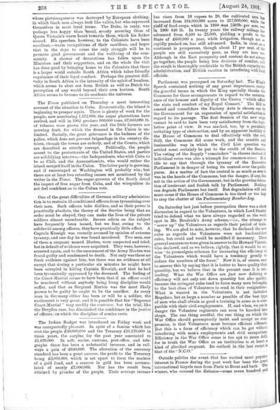On. Saturday last just before prorogation there was a short
discussion in regard to the Volunteers, in which Lord Stanley tried to defend, what we have always regarded "as the weak spot in Mr. Brodrick's Army scheme,—i.e., the attempt to " screw up 7 the Volunteers as regards their period of train- ing. We are glad to note, however, that he declared the new rules as regards the Volunteers were not hard-and-fast rules, but could and would be modified if necessary. These general assurances. were given in answer to Sir Howard Vincent, who declared, and as we believe, rightly, that it would be un- wise " to promulgate. schemes for increasing the efficiency of the. Volunteers which would have . a tendency greatly to reduce the numbers of the force." NOvr it is, of course, easy to answer this by saying that it is better to have quality than quantity, -but we believe that in the present case it is mis- leading. What the WUr Office are just now defining as efficiency will not Qnly cut down quantity but also quality. because the stringent rules tend to force Many men belonging to the best class of VOlunteers to send in their resignations. What is Wanted in the Volunteers it not imitation Begularsehut as large a number as possible of the best type of men who shall obtain as good a training in arms as is cone patible with their civil employments. If, and when we are in dagger the Volunteer regiments can soon he knocked into shape. The one thing needful, the one thing on which the War Office should peremptorily insist., and accept no cowl- promise, is that Volunteers must become efficient riflemen. But this is a form of efficiency which can be got without interfering with • men s employments and civil occupations. Efficiency in the War Office sense is too apt, to mean drill, for in truth the War Office as an institution is at heart a kind of glorified sergeant Its outlook in -the last resort is that of the "N.C.0."


































 Previous page
Previous page